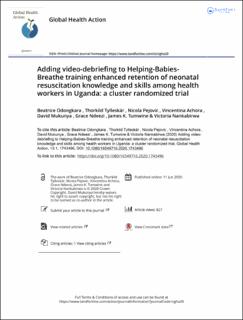| dc.contributor.author | Odongkara, Beatrice | |
| dc.contributor.author | Tylleskär, Thorkild | |
| dc.contributor.author | Pejovic, Nicolas | |
| dc.contributor.author | Achora, Vincentina | |
| dc.contributor.author | Mukunya, David | |
| dc.contributor.author | Ndeezi, Grace | |
| dc.contributor.author | Tumwine, James K. | |
| dc.contributor.author | Nankabirwa, Victoria | |
| dc.date.accessioned | 2021-05-03T09:36:50Z | |
| dc.date.available | 2021-05-03T09:36:50Z | |
| dc.date.created | 2021-02-19T21:46:34Z | |
| dc.date.issued | 2020 | |
| dc.identifier.issn | 1654-9716 | |
| dc.identifier.uri | https://hdl.handle.net/11250/2753196 | |
| dc.description.abstract | Background: Skilled birth attendants must be competent to provide prompt resuscitation to save newborn lives at birth. Both knowledge and skills (competence) decline with time after training but the optimal duration for refresher training among frontline-skilled birth attendants in low-resource settings is unknown.
Objectives: We assessed the effect of an innovative Helping-Babies-Breathe simulation-based teaching method using video-debriefing compared to standard Helping-Babies-Breathe training on 1) neonatal resuscitation knowledge and skills attainment and 2) competence retention among skilled birth attendants in Northern Uganda.
Methods: A total of 26 health facilities with 86 birth attendants were equally randomised to intervention and control arms. The 2nd edition of the American Association of Pediatrics Helping-Babies-Breathe curriculum was used for training and assessment. Knowledge and skills were assessed pre- and post-training, and during follow-up at 6 months. A mixed effects linear regression model for repeated measures was used to assess the short and long-term effects of the intervention on neonatal resuscitation practices while accounting for clustering.
Results: Eighty-two (95.3%) skilled birth attendants completed follow-up at 6 months. Approximately 80% of these had no prior Helping-Babies-Breathe training and 75% reported practicing neonatal resuscitation routinely. Standard Helping-Babies-Breathe training with video-debriefing improved knowledge and skills attainment post-training [adjusted mean difference: 5.34; 95% CI: 0.82–10.78] and retention [adjusted mean difference: 2.97; 95% CI: 1.52–4.41] over 6 months post-training compared to standard training after adjusting for confounding and clustering. Factors that reduced knowledge and skills retention among birth attendants were monthly resuscitation of one neonate or more and being in service for more than 5 years.
Conclusion: Adding video-debriefing to standard Helping-Babies-Breathe training had an effect on birth attendants’ competence attainment and retention over 6 months in Uganda. However, more research is needed to justify the proposed intervention in this context. | en_US |
| dc.language.iso | eng | en_US |
| dc.publisher | Taylor & Francis | en_US |
| dc.rights | Navngivelse 4.0 Internasjonal | * |
| dc.rights.uri | http://creativecommons.org/licenses/by/4.0/deed.no | * |
| dc.title | Adding video-debriefing to Helping-Babies-Breathe training enhanced retention of neonatal resuscitation knowledge and skills among health workers in Uganda: a cluster randomized trial | en_US |
| dc.type | Journal article | en_US |
| dc.type | Peer reviewed | en_US |
| dc.description.version | publishedVersion | en_US |
| dc.rights.holder | The work of Beatrice Odongkara, Thorkild Tylleskär, Nicola Pejovic, Vincentina Achora, Grace Ndeezi, James K. Tumwine and Victoria Nankabirwa is 2020 Crown Copyright. David Mukunya hereby waives his right to assert copyright, but not his right to be named as co-author in the article. | en_US |
| dc.source.articlenumber | 1743496 | en_US |
| cristin.ispublished | true | |
| cristin.fulltext | original | |
| cristin.qualitycode | 1 | |
| dc.identifier.doi | 10.1080/16549716.2020.1743496 | |
| dc.identifier.cristin | 1891956 | |
| dc.source.journal | Global health action | en_US |
| dc.identifier.citation | Global health action. 2020, 13 (1), 1743496. | en_US |
| dc.source.volume | 13 | en_US |

